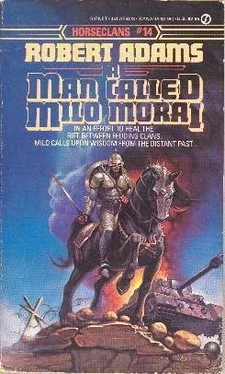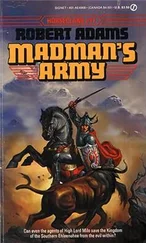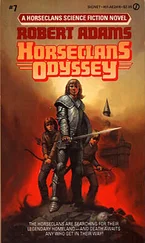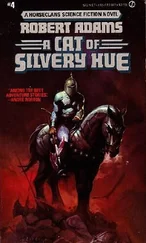Robert Adams - A Man Called Milo Morai
Здесь есть возможность читать онлайн «Robert Adams - A Man Called Milo Morai» весь текст электронной книги совершенно бесплатно (целиком полную версию без сокращений). В некоторых случаях можно слушать аудио, скачать через торрент в формате fb2 и присутствует краткое содержание. Жанр: Фантастика и фэнтези, на английском языке. Описание произведения, (предисловие) а так же отзывы посетителей доступны на портале библиотеки ЛибКат.
- Название:A Man Called Milo Morai
- Автор:
- Жанр:
- Год:неизвестен
- ISBN:нет данных
- Рейтинг книги:3 / 5. Голосов: 1
-
Избранное:Добавить в избранное
- Отзывы:
-
Ваша оценка:
- 60
- 1
- 2
- 3
- 4
- 5
A Man Called Milo Morai: краткое содержание, описание и аннотация
Предлагаем к чтению аннотацию, описание, краткое содержание или предисловие (зависит от того, что написал сам автор книги «A Man Called Milo Morai»). Если вы не нашли необходимую информацию о книге — напишите в комментариях, мы постараемся отыскать её.
A Man Called Milo Morai — читать онлайн бесплатно полную книгу (весь текст) целиком
Ниже представлен текст книги, разбитый по страницам. Система сохранения места последней прочитанной страницы, позволяет с удобством читать онлайн бесплатно книгу «A Man Called Milo Morai», без необходимости каждый раз заново искать на чём Вы остановились. Поставьте закладку, и сможете в любой момент перейти на страницу, на которой закончили чтение.
Интервал:
Закладка:
- “A Tribal Bard? A boy of Clan Linsee to be Tribal Bard?” Hwaltuh Linsee was so shocked that he spoke aloud, in a hushed tone. “That is so great an honor for the clan that I feel safe in saying that you’ll get no single objection from the chief, and any that the clan bard might voice will be overridden by the chief and the Linsee Council. The Song of Linsee tells of right many mighty warriors, brave and wise chiefs, skillful hunters and the like, but nowhere of a Tribal Bard of our blood.
“You tell the Linsee your plans for our Gy … or better yet, let me have the time to tell him before you come to the chiefs yurt. I feel free to promise that there will be no slightest objection or condition to Gy going off with you and Bard Herbuht.”
When, the next morning, half the horses were mind-called down from the prairie above to be saddled for the hunting and foraging parties, Hwaltuh Linsee came down astride the bare back of one of them, not looking as if he had slept well, if at all.
“There’s some something nosing around up there, right enough, Uncle Milo,” he reported. “It’s never gotten really close to the herd, and it’s canny enough to stay downwind so that neither the horses nor the cats can scent it properly, but it’s there, anyway.
“You take half of my hunt with you, today. I’m going to keep the other half of them and both of the prairiecats with me here, and I mean to find out just what is up there and whether or not it represents a danger to the horses.”
Milo shook his head. “Hwaltuh, recall if you will, these aren’t grown warriors we’re dealing with, Jthis hunt. If whatever is up there is at all dangerous or very big or there’s more than just one of them, you’re going to be hard pressed with only a handful of boys and girls to back you, with or without the cats and a few stallions. Keep your entire hunt here today. I know exactly where I’m taking mine, for a change, and immediately we’ve harvested those pigs, I’ll bring them back with the meat. We’ve done a lot of butchering down here in the last week, and who knows what sorts of predators or scavengers we might have attracted.”
Once up on the prairie level, Milo rode close enough to the now-reduced horse herd to mindspeak the two prairiecats, Snowbelly and Crooktail.
“Uncle Milo,” Snowbelly informed him, “I have never smelled this scent before. It is a little like a big weasel or a skunk, but also it is a little like an average-sized wild cat or a tree cat or even one of the cats of the high plains.”
“Does it smell at all like one of your kind?” queried Milo, thinking that they still occasionally came across a wild prairiecat, though such occurrences were getting rarer and rarer.
“No, Uncle Milo, not one of our kind,” the cat’s beaming assured him. “Whatever it is is as big as a full-grown wolf, but it is no wolf—no wolf ever smelled like that.”
“Well,” Milo beamed, “Subchief Hwaltuh is staying behind with all of his hunt today, and he means to find it, whatever it is.”
Aided by the exceptionally keen-nosed Snowbelly, Subchief Hwaltuh Linsee with a half-dozen members of his hunting party had backtracked one of the creatures that had been prowling around the vulnerable horse herd. Now he and the youngsters were squatting on the muddy bank of a small stream, some mile or more from the campsite. Strange tracks, big tracks, were all about them, and the odor which had so bothered the cats was here strong enough for even the humans to catch its powerful, musky reek.
Wrinkling up his nose in clear distaste, the big prairie-cat beamed, “There are nine of the beasts, at least in this pack, and they made a kill in this spot last night. The smell of deer blood still is strong in this mud, despite the other stench overlying it. They killed it here and ate it here.”
“Then where are the bones?” beamed Hwaltuh puzzledly. “What became of the hooves, the skull, the antlers, if any? Foxes?”
“No, Subchief,” Snowbelly’s powerful telepathy replied. “No recent smell of foxes or any other kind of small scavenger is here. Those strange beasts must have eaten the entire carcass—meat, guts, hide, bones, hooves and all. And I find this most odd, for this was no small deer they killed, Subchief Hwaltuh, and they did not lie up here and gnaw away at those bones like normal beasts, but seem to have eaten them as quickly and as easily as they ate the softer parts. No wolf could do such —or would so do in a country so full of game—yet you can see by the size and the depth of the spoor, these smelly beasts are none of them larger than an average prairie wolf.”
The Linsee subchief frowned. “It is something beyond my ken or experience, Snowbelly. Can you range the hunt chief? Or Uncle Milo?”
“This cat will try,” beamed Snowbelly, then, after a moment, “No, Subchief, both of them are out of my distance.”
The warrior stood up then, saying, “All right. Let’s see if we can trail them from this place to wherever they went next. Strung bows, everyone, with one shaft nocked and two more ready. Any beast that can carelessly munch the bones of a big deer could just as easily shear through the leg of a horse or any part of one of us. Only a fool would trail such a beast all unready.”
The trail of the smelly beasts wound on down the stream bank for a quarter mile or so, then struck out across the prairie, angling back more or less in the direction of the horse herd and the campsite. This bothered Hwaltuh, and he ordered the pace increased accordingly, for in his absence, there now were no adult humans in the camp, only some bare dozen youngsters—• one of them lying burned and helpless—and Crooktail, the other prairiecat.
Nearer to the herd and campsite, Crooktail had perceived the emanations of a large feline, not one of his own kind, but in many ways similar, and, even as Subchief Hwaltuh and his band rode for the camp, the prairiecat was in silent converse with the spotted, short-fanged cat (Milo would have called her a jaguar, while the far-southern clans would have used the Mekikahn word, teegrai , to describe her).
A young cat, without a clearly defined personal territory as yet, she had followed the migrating herds north in the spring, and she now was headed south again as the weather became colder. She was roughly of a size with Crooktail, though finer-boned and less beefy of body. She seemed fascinated to learn that twolegs and a variety of cat not only lived together in harmony but even shared the hunt and the protection of grass-eaters from other beasts.
When Crooktail “described” the scent of the strange prowlers, the spotted cat replied, “Yes, the skunk-wolves. There are not many of them anywhere, though they are more common farther south than here. They will eat anything living or dead, and although they often kill their own food, they will still take a kill from any other they can find or catch. They themselves are inedible, even the young ones. But tell this cat more of these strange twolegs you claim as brothers and sisters and who keep you fed even when you cannot hunt, in the times of the cold-white.”
Far from Crooktail and his wild feline companion-of-the-moment, away over on the other side of the horse herd, near to the edge of the bluffs, a mare had just dropped a foal. Her dark-bay flanks still trembling with strain, she was licking the infant horseling clean when her heightened senses told her of the imminence of deadly danger to her and her foal.
Two brownish, striped meat-eaters were stalking her in the open in a series of short, sidling rushes. They both stood as tall as or taller than a prairiecat—as much as six hands at the withers, though their bodies sloped sharply back toward the crupper. An erect crest of stiff hair stood up along their withers and thick necks, and their opened mouths were all big, gleaming teeth.
Читать дальшеИнтервал:
Закладка:
Похожие книги на «A Man Called Milo Morai»
Представляем Вашему вниманию похожие книги на «A Man Called Milo Morai» списком для выбора. Мы отобрали схожую по названию и смыслу литературу в надежде предоставить читателям больше вариантов отыскать новые, интересные, ещё непрочитанные произведения.
Обсуждение, отзывы о книге «A Man Called Milo Morai» и просто собственные мнения читателей. Оставьте ваши комментарии, напишите, что Вы думаете о произведении, его смысле или главных героях. Укажите что конкретно понравилось, а что нет, и почему Вы так считаете.












